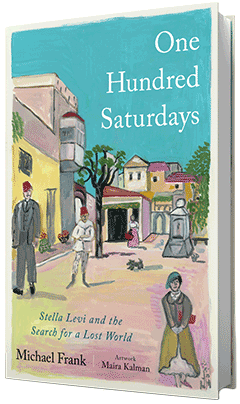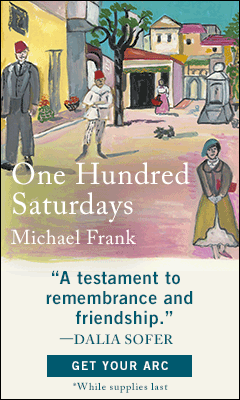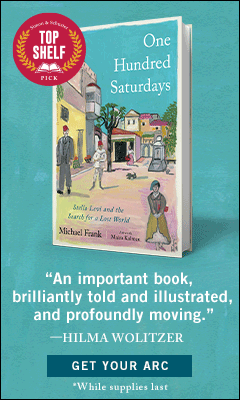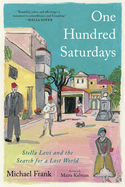One Hundred Saturdays: Stella Levi and the Search for a Lost World
by Michael Frank, illus. by Maira Kalman
This emotionally stunning biography relates the story of one of the last Jewish survivors of the Greek island of Rhodes, recounting in immersive prose her childhood in a now-eradicated community, her survival of the concentration camps and her endurance carrying that traumatic weight.
On one of their first Saturdays together--eventually becoming 100 Saturdays over the course of six years, after meeting at an Italian studies lecture in New York City--Michael Frank asks Stella Levi if she will share her life story. "Possibly," she says. "But not the camps.... I don't want to be that person." Frank realizes she doesn't want the Holocaust "placed so central, too central, in a long, layered life." Her reticence to become a "performing survivor" is likely why Frank succeeds in making vivid the myriad beauties of Levi's life.
At the story's heart is the beloved Juderia, the Jewish quarter of Rhodes, spanning about "ten, twelve square blocks in all" of narrow, unevenly cobblestoned streets, its main piazza hosting an array of shops, its courtyards smelling of "jasmine and rosemary, lavender and roses and rue." Its inhabitants listened to the old women sitting outside telling stories, who baked at the communal oven while gossiping, bathed only "at the Turkish baths, once a week, before shabbat" and absorbed proverbs "as though they were molecules in the air." Doors of houses stayed flung open, facilitating the "call and response" of housemaids and mothers.
Levi recalls the rituals that marked her younger years--deaths, weddings, Yom Kippur, Passover, the frisson of first love. When Levi, curious and ambitious, entered high school, "boom, a new world was opened to her." The image of her packing a suitcase at age 14 to be ready for university echoes throughout the book--especially when Levi recalls the 1938 racial laws that prohibited her from attending school and her father from running his business. "I felt like my family and I were being treated like animals--animals don't need to work or study, do they?"
But even as persecution of Jewish communities worsened, Levi's family stayed in the Juderia. "Terrible things were happening to the Jews, but they were happening, it seemed, in another world," Levi says. "Even as we were boarding the boats that took us away from Rhodes, we thought, Oh, we're going to another island. We're going to a work camp. All this is temporary. We'll be back, of course we will." Frank's gentle prompts ease Levi into recounting her deportation to Auschwitz, among the 1,650 Jews collected from Rhodes, and her ultimate survival of five different camps. But after her eventual liberation, there was no home to return to--"We had left a whole community in the ashes of Auschwitz"--a cutting truth and condemnation of all that war destroys.
One Hundred Saturdays is a story in which Levi's voice is always strikingly present. "This knowledge" of those dying around her was "a flame. Too ferocious to come near. If we touched it, we might ourselves die." She exudes power, the power of a woman who had the strength to keep on living. Frank adroitly lays the groundwork for Levi to divulge her courage: " 'You, a young Jewish woman, went to see Kleemann, the Nazi officer in command of Rhodes, to ask him for a favor?' She answers with a placid nod." On the weeks-long journey to Auschwitz, she asked a captain for a lemon for her faint mother and gained permission to swim alongside the boat. At Auschwitz, she took a blow for her father and bent the rules to bring him water. The luck that allowed her survival, however, is not ignored: "Every survivor has a moment, two moments, ten moments of incredible luck."
Frank also opens a window into their interviews. After recalling the agua de flor daubed on her weekly at the hamman (Turkish bath), Levi presents a vial of liquid to Frank. "Would you like a whiff?" Levi asks him. He obliges and describes the scent for readers: "Jasmine, yes. Pronounced. Maybe also a touch of orange blossom." On one Saturday, Levi opens the door "looking as though she hadn't slept," eyes "glassy and distant, and smudged with shadows" and tells Frank she dreamt of her sisters, of being confused about the location of her home. On other days, her eyes sparkle after eluding a question, or she moves "as if a tightly-wound coil is set free, ping, sending her into the air."
The accompanying artwork by Maira Kalman allows readers a fascinating lens through which to view Levi's retelling. The full-color gouache paintings, boasting a rich palette of burgundies, yellows, blues and greens, depict moments both small (Stella wearing an outfit her sister sent from "Ah-merica") and life-altering ("The window [that] was the last thing Stella saw that connected her to the Juderia"). Only two images, however, represent Levi's experience of the camps; most serve to reproduce Levi's bright memories of family and friends.
Frank's skillful descriptions and Kalman's tender illustrations, by conjuring a striking portrait of a beautifully tight-knit and unassuming community, starkly highlight the scale of hate for the Jewish population. That the war would need to touch a space that seemed almost apart from the world communicates bigotry's lack of boundary, hate's impossible reach. Yet above all, this biography pins to the page the story of a place and a people worthy of knowing--a lost world preserved in the carefully captured memories here. --Samantha Zaboski








_Marta_Barisione.jpg)